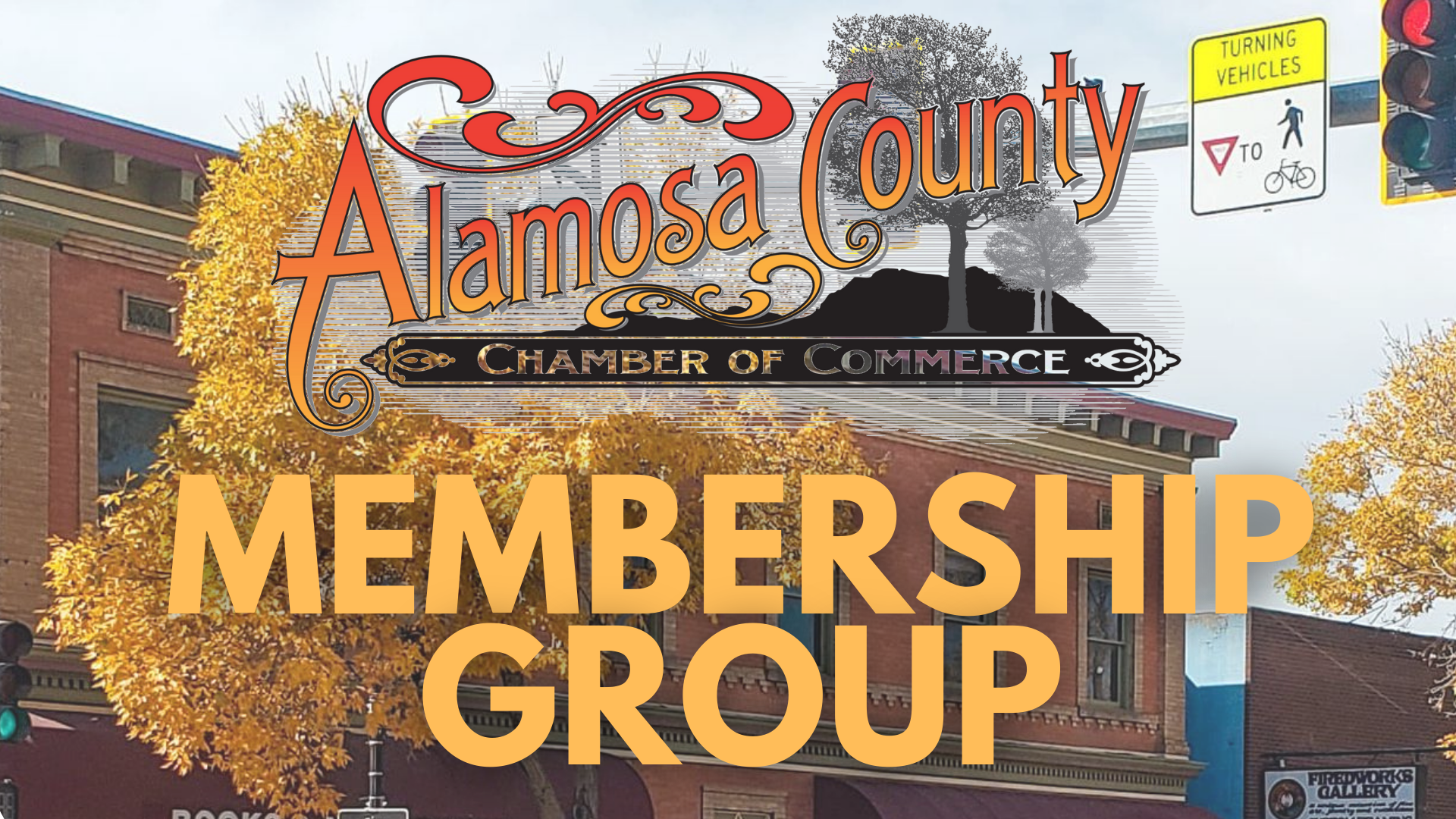Scroll down for stances on current proposed legislation, and for other Current & Past advocacy Efforts
Our Members are our purpose and the foundation of our community. As a member organization, we exist for YOU.
Are you a Chamber Member with an issue or concern? Do you have a project we can help with? Let us know!
Get involved:
Current Advocacy Efforts
We want to ensure all businesses and organizations are aware of the current CDOT Draft Access Control Plan for the Alamosa US160/US285 corridor, and have an opportunity to submit feedback.
The Alamosa County Chamber of Commerce has drafted a response letter reflecting concerns and the need for more dialogue and outreach, and if any businesses or organizations would like to also sign on to the letter, please fill out the form below.
IMPORTANT DATES
Public Open House #2 on Thursday, March 26, 2026 at 5:30 p.m. in Council Chambers
IGA for adoption at the regular City Council Meeting on Wednesday, June 3, 2026 at 7:00 p.m.
*Note- some changes have been made to the plan in response to business feedback, we are working to obtain a new copy of the updated plan
2026 LEGISLATIVE SESSION:
HB26-1054
Protections for Worker Safety
CHAMBER STANCE = OPPOSE
House Bill 1054 would create a new state-level enforcement system for workplace health and safety violations on top of the federal OSHA system that already regulates workplace safety in Colorado. Under the bill, workplace safety complaints could be filed by state agencies, individual workers, whistleblowers, labor organizations and the attorney general. The bill would also allow lawsuits to be brought against employers and authorize courts to impose financial penalties and damages.
In addition, HB 1054 would give state lawmakers the authority to create new workplace safety rules or replace federal standards if they believe worker protections have been weakened at the federal level. As a result, employers could be subject to different or additional requirements beyond existing federal rules.
This approach creates a duplicative and overcomplicated enforcement system and increases litigation risk for businesses of all sizes. Employers would be forced to navigate conflicting state and federal requirements, driving up compliance costs for businesses across the state.
HB 1054 would create unnecessary complexity and cost without clear evidence that it would improve safety for workers.
HB26-1012: Consumer Protections to Promote Fair Market Pricing
CHAMBER STANCE = OPPOSE
Update: *DEAD*
What we did: The Chamber signed on to a letter with the CO Chamber of Commerce, shared our stances with our Representatives, and testified when the bill was reviewed by the House Judiciary Committee.
HB26-1012 bill prohibits a person or business from charging unreasonably excessive prices to a captive consumer and defines "captive consumer" as a consumer who is at a location at which a seller of ancillary goods or services does not have competitors regarding the ancillary goods or services being sold. A person that charges unreasonably excessive prices to a captive consumer engages in an unfair or deceptive trade practice in violation of the "Colorado Consumer Protection Act".
This bill defines captive consumers as consumers in any of the following areas:
At an airport
In a hospital or emergency room
At an event venue with a seating or standing capacity of 2,000 or more individuals
At an organized outdoor event, such as a fair or festival, for which more than 2,000 attendees are expected
In a correctional facility
HB26-1012 would be devastating to Colorado's event venues, entertainment and tourism, and the State's ability to attract large festivals and conventions. It would also place increased financial and compliance burdens on hospitals and airports.
It’s important to note that this would have an effect whether an entity is believed to charge high prices or not. The requirements would be extremely difficult if not impossible for smaller organizations, volunteer event planners, and small businesses to adhere to and could result in the loss of services, offerings, and events for communities like ours.
SB 26-49: HOMEOWNER NATURAL DISASTER MITIGATION
CHAMBER STANCE = SUPPORT
SB26-49 reduces the cost of living for Colorado homeowners and ensures the continued availability of homeowners insurance in the state. Colorado homeowners’ insurance ranks at 4th more expensive in the nation, with costs growing as increasingly frequent and destructive natural disasters occur in the state. Coloradans face costly repairs and insurance premium increases compared to other states due to the frequency of hail events and prevalence of wildfires. Proactive mitigation is proven to both protect a home during a natural disaster and reduce insurance premiums.
Summary of SB26-49: The bill incentivizes Coloradans to protect their homes against natural disasters and lower their insurance premiums. The first incentive expands recipients of natural disaster mitigation funding from solely local governments to include individual homeowners and HOAs. The second establishes a tax-exempt savings account to be used by individuals to pay homeowners insurance deductibles, install impact resistant roofing or perform wildfire mitigation projects.
Background: Several states in areas prone to extensive hurricane damage have offered similar grant programs and tax incentives to strengthen homes against natural disasters. Nationally recognized standards for impact resistant roofing and wildfire mitigation have been adopted by other states and lead to proven insurance discounts.
Reasons to Support SB26-49
SB26-49 lowers the increasing cost of living for Coloradans: Homeowner’ premiums are rising to unaffordable levels as the cost of materials increases and disasters become more frequent. Disaster mitigation both reduces costs for homeowners up front and lowers insurance premiums, reflecting the lessened risk for insurers. While continued natural disasters are out of homeowners’ control, disaster mitigation projects will lead to lower damage costs.
SB26-49 ensures Colorado homeowners have access to insurance. Options for homeowners’ insurance are shrinking as construction costs grow and disasters continue to cause significant damage to Colorado communities. Incentives for homeowners to proactively mitigate risk both lowers settlement costs for insurers and protects choice of insurer for Coloradans.
Proactive mitigation is proven to reduce insurance premiums. The bill requires mitigation projects to comply with widely accepted impact resistant roofing and wildfire standards. Programs in other states using the same standards have resulted in welldocumented reductions in homeowners’ insurance premiums.
Where we represent & Support our Members*:
-ACCC (Association for Colorado Chambers of Commerce) (State-Wide)
-Broadband Coalition
-C3 Steering Committee (Regional)
-City of Alamosa Main Street Advisory Committee
-Colorado Creative District Committee
-Early Childhood Community Stakeholders Advisory Group
-Economic Development Advisory Board
-Ice Fest Planning Committee
-Letter of Recommendation for Chamber Members and other projects aligning with our Advocacy Policy
-Local Coordinating Organization (LCO) - Universal Preschool Advisory Group
-Rally for Air Service (Nationwide)
-Revitalize the Rio
-SLV Bookkeeping
-San Luis Valley Healthcare Sector Partnership
-San Luis Valley Little Learners Academy (SLVLLA) Board of Directors
-San Luis Valley Regional Airport Board
-San Luis Valley Regional Airport Marketing Committee
-Save Small Business Coalition (Nationwide)
-SLVH Community Health Needs Assessment Bi-Annual Group
-Small Business Development Center Support
-Small Business Saturday® Official Neighborhood Champion
-Summerfest on the Rio Event Board
*Chamber CEO or Board Member sit on board/committee directly on behalf of the Alamosa Chamber and its Members.
The Alamosa County Chamber of Commerce OPPOSES the Renewable Water Resources (RWR) and their ongoing efforts to divert water from the SLV. (Regional)
PAST ADVOCACY/STANCES
Support for extension of the 2017 Tax Cuts and Jobs Act (TCJA)
Support a Small Business Exemption from Tariffs
Small businesses drive innovation, create jobs, and strengthen our local economies. However, rising tariffs have placed an outsized burden on small firms —raising costs, disrupting supply chains, and threatening small business’ ability to compete.
Unlike large corporations, small businesses cannot absorb these costs without serious consequences. That’s why we support the passage of the Small Business Liberation Act which would create a tariff exemption for small businesses. This commonsense exemption would recognize the limited negotiating power and tighter margins of small firms, while helping them continue to grow, hire, and serve their communities.
We urge policymakers to create a targeted exemption from tariffs for small businesses.
Support of EDCC's efforts in codifying HB 24-1160, Economic Development Organization Action Grant Program into OEDIT
There are many Bills to be aware of that have been nicknamed ‘Job Killers”. We recommend taking the time to look into each bill, and to reach out to representatives regarding concerns and examples of how these can negatively affect your business.
Past Issues/Stances
OPPOSE: HB 23-1118 Fair Workweek Bill
HB 1118 would have a sweeping impact on thousands of public & private employers, place new restrictions on scheduling practices & hurt those it intends to help. It is the most punitive proposal in the country & fails to consider basic operational needs of businesses, social service providers, public & private schools, healthcare providers & others…
SUPPORT: SB23-001 Authority of Public-private Collaboration Unit For Housing Summary:
This bill allows the Authority of Public-Private Collaboration in the Department of Administration to engage in housing projects on unused state properties.
Justification:
Housing is one of the most pressing issues facing Colorado communities and employers. This proposal allows the state to use state properties to develop needed housing in communities across the state.
SUPPORT: SB23-006 Creation Of The Rural Opportunity Office
Summary:
This bill creates the Rural Opportunity Office in the Office of Economic Development. The Office is charged with supporting Colorado’s rural communities, economic development offices, business support organizations and small businesses to explore economic development and business opportunities in rural communities across the state.
Justification:
The Rural Opportunity Office fosters and promotes economic resiliency and provides economic development support to rural regions such as ours.
SUPPORT: HB23-1035 Statute Of Limitations Minimum Wage Violations
Summary:
This bill would create a standard 2-year time limit on minimum wage violations.
Justification:
Colorado’s minimum wage law, which applies to much more than just minimum wages and those employees, does not have an articulated statute of limitations. As a result, there is no set rule and judges are imposing differing time limits on claims, exposing employers to uncertain liability, particularly in class actions. Other state and federal wage laws have a standard 2-year time limit on claims. Employers and employees need the predictability of knowing when a wage claim may be brought, and our Legal Advisory Committee highly recommends supporting this bill.
OFFICIAL STANCES 2022
Supports the Chips for America Act (National)
The Alamosa County Chamber of Commerce OPPOSES the Renewable Water Resources (RWR) proposal to Douglas County and other efforts to divert water from the SLV. (Regional)
The Alamosa County Chamber of Commerce SUPPORTED the effort to recall District Attorney Alonzo Payne.
Past Updates:
After three days of legislative work, the Colorado General Assembly has adjourned the 2020 special session. While 35 bills were introduced on Monday, only 10 were passed and sent to the Governor for his signature. Seven key policy issues were the focus of the Governor’s call of the special session: small business relief; child care support; housing and direct rental assistance; increasing broadband access for P-12; food insecurity; utilities assistance; and public health response.
Below is more information and links to the bills that were adopted.
HB20B-1001 — Grants to Improve Internet Access in P-12 Education — The bill creates the Colorado Students Grant Program to provide $20M in grants to local education providers to use in providing broadband services and other technology for increased access for students, educators and other staff. http://leg.colorado.gov/bills/hb20b-1001
HB20B-1002 — Emergency Relief for Child Care Sector — The bill creates two grant programs to support child care in the state and appropriates $45M for these programs. http://leg.colorado.gov/bills/hb20b-1002
HB20B-1003 — Food Pantry Assistance Grant Program — The bill makes changes to the Food Pantry Assistance Grant Program and appropriates $5M for the program. http://leg.colorado.gov/bills/hb20b-1003
HB20B-1004 — Qualified Retailer Retain Sales Tax For Assistance — The bill allows qualifying retailers to temporarily deduct up to $70,000 in net taxable sales from their monthly state sales tax return and retain the resulting sales tax revenue for sales made in November and December 2020 and in January and February 2021. This bill applies to retailers in the alcoholic beverages drinking places industry, the restaurant and other eating places industry, and the mobile food services industry. http://leg.colorado.gov/bills/hb20b-1004
HB20B-1005 — Local Authority to Impose Food Delivery Fee Restrictions — The bill allows municipalities and counties to limit the fee that a third-party food delivery service may charge to a retail food establishment and place other restrictions on delivery services. http://leg.colorado.gov/bills/hb20b-1005
HB20B-1006 — Insurance Premium Tax Payments and Credits — The bill makes changes to how insurance premium estimated taxes are paid, including adjusting how calendar quarter estimates are calculated and allowing each calendar quarterly estimate payment to include adjustments for any previous calendar quarter estimates of taxes including tax credits. http://leg.colorado.gov/bills/hb20b-1006
SB20B-001 — COVID-19 Relief Small and Minority Business Arts Organizations — The bill provides relief to small businesses, arts and cultural organizations, and minority-owned businesses. It appropriates $57.1M for these purposes. http://leg.colorado.gov/bills/sb20b-001
SB20B-002 — Housing and Direct COVID Emergency Assistance — The bill creates the Emergency Direct Assistance Grant Program in DOLA to support housing assistance programs. It transfers $60M from the General Fund for these purposes. http://leg.colorado.gov/bills/sb20b-002
SB20B-003 — Money for Energy Utility Bill Payment Assistance — The bill transfers $5M from the General Fund to the Energy Outreach Colorado Low-Income Energy Assistance Fund to provide direct energy bill payment assistance to low-income households. http://leg.colorado.gov/bills/sb20b-003
SB20B-004 — Transfer to Make Money Available for COVID-19 Emergency — The bill transfers $100M from the General Fund to the Controlled Maintenance Trust Fund and allows the Governor to transfer these funds to the Disaster Emergency Fund for public health and critical response associated with the COVID-19 emergency. http://leg.colorado.gov/bills/sb20b-004
2020 Ballot Issues
Official stances
“As a Chamber of Commerce in rural Colorado, the decision to oppose the NPV was an easy one. Our Mission as an organization is centered around support for our business community at it's core, and to give away our voice and our votes to other areas of the nation, particularly those with traditionally unfriendly business climates would not be supportive of that mission.” -Erin Keck, Executive Director, Alamosa County Chamber of Commerce
Other key issues for business
Ballot text: Without increasing property tax rates, to help preserve funding for local districts that provide fire protection, police, ambulance, hospital, kindergarten through twelfth grade education, and other services, and to avoid automatic mill levy increases, shall there be an amendment to the Colorado constitution to repeal the requirement that the general assembly periodically change the residential assessment rate in order to maintain the statewide proportion of residential property as compared to all other taxable property valued for property tax purposes and repeal the nonresidential property tax assessment rate of twenty-nine percent?
A "yes" vote supports the following:
repealing the Gallagher Amendment, which set residential and non-residential property tax assessment rates in the state constitution;
allowing the Colorado State Legislature to freeze property tax assessment rates at the current rates (7.15% for residential property and 29% for non-residential property);
allowing the state legislature to provide for future property tax assessment rate decreases through state law; and
continuing to require voter approval for rate increases due to TABOR.
A "no" vote supports:
maintaining the Gallagher Amendment, which requires a residential to non-residential property tax ratio of 45% to 55% and requires the state legislature to adjust the residential assessment rate to maintain the required ratio. Since 1982, the residential property tax assessment rate has dropped from 21% to 7.15% under the Gallagher Amendment.
How does this affect businesses?
If passed, will lessen the increasing tax burden on businesses in Colorado, thus helping to create a more business-friendly climate. Also has the potential to put Colorado in a better position to recruit more business and create jobs.
A "yes" vote supports:
establishing a paid family and medical leave program in Colorado to provide 12 weeks (up to 16 weeks in certain cases) of paid leave (with a maximum benefit of $1,100 per week)
funded through a payroll tax to be paid for by employers and employees in a 50/50 split
A "no" vote opposes:
establishing a paid family and medical leave program in Colorado.
How does this affect businesses?
This ballot initiative imposes a payroll tax increase on all Colorado families and businesses during an unprecedented pandemic where business have been faced with shutdowns and severe economic hardship. Concerns continue for how to keep businesses afloat and keeping Coloradans employed.
As this also is limited to businesses 10 employees and over, this initiative also creates an incentive for businesses not to grow as it creates a bigger financial burden to do so.
Ballot text: Shall there be a change to the Colorado Revised Statutes concerning the creation of a paid family and medical leave program in Colorado, and, in connection therewith, authorizing paid family and medical leave for a covered employee who has a serious health condition, is caring for a new child or for a family member with a serious health condition, or has a need for leave related to a family member’s military deployment or for safe leave; establishing a maximum of 12 weeks of family and medical leave, with an additional 4 weeks for pregnancy or childbirth complications, with a cap on the weekly benefit amount; requiring job protection for and prohibiting retaliation against an employee who takes paid family and medical leave; allowing a local government to opt out of the program; permitting employees of such a local government and self-employed individuals to participate in the program; exempting employers who offer an approved private paid family and medical leave plan; to pay for the program, requiring a premium of 0.9% of each employee’s wages, up to a cap, through December 31, 2024, and as set thereafter, up to 1.2% of each employee’s wages, by the director of the division of family and medical leave insurance; authorizing an employer to deduct up to 50% of the premium amount from an employee’s wages and requiring the employer to pay the remainder of the premium, with an exemption for employers with fewer than 10 employees; creating the division of family and medical leave insurance as an enterprise within the department of labor and employment to administer the program; and establishing an enforcement and appeals process for retaliation and denied claims?
























